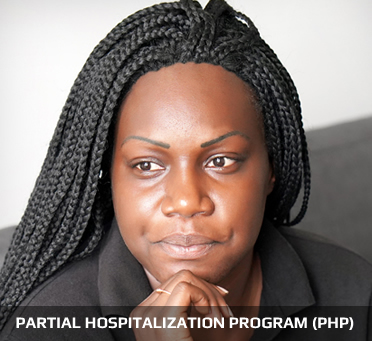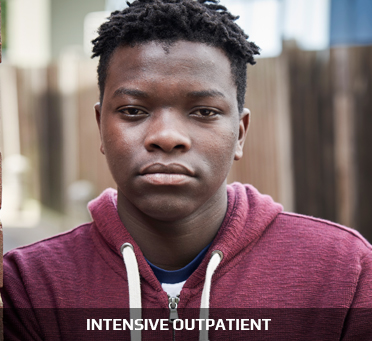
Outpatient Mental Health Center (OMHC)
Elevate’s Outpatient Mental Health Center (OMHC) offers private, compassionate talk therapy in a safe, clinical setting. Licensed mental health professionals provide support tailored to each individual’s needs.
This therapy is often called “counseling,” but it’s different from Substance Use Disorder (SUD) counseling. Many insurance plans will still cover OMHC sessions even if a client is also receiving SUD treatment.
At Elevate, OMHC clients work at their own pace alongside experienced clinicians to set personalized goals. Therapy sessions can support a wide range of needs, including:
-
pursuing greater self-knowledge and personal growth,
-
coping with depression, anxiety, PTSD, Bipolar disorder, and other diagnoses,
-
untangling generational or childhood trauma,
-
exploring feelings associated with major life transitions,
-
identifying aspects of life or self that might need change,
-
addressing self-care or work/life balance, and more.
There’s no set timeline for progress. Each client collaborates with their therapist to build a care plan that fits their goals and circumstances.
Outpatient Mental Health Center Therapy
- Cognitive Behavioral Therapy
- Dialectical Behavioral Therapy
- Motivational Interviewing (MI)
- Trauma-Informed Care
- Client-Centered Treatment
- Strengths-Based Approach
- Mindfulness and many other evidenced-based practices
Our licensed, knowledgeable, and caring therapists work with clients to explore the many aspects that make up the whole person and might be contributing to mental health concerns.
Our multidisciplinary team uses integrated treatment to address mental health disorders that co-occur with addiction.
- This approach helps uncover the underlying issues contributing to SUD and mental illness.
- It also examines both the causes and effects of those challenges.
- Clients gain practical tools to help maintain progress after therapy ends.
- They also learn techniques for sustainable self-care and emotional regulation.
Individual (One-On-One) Sessions
Therapists create a safe, dedicated space where clients can explore personal challenges at their own pace.From depression and/or anxiety coping skills, to grief, trauma, and more, clients can look at what makes them who they are and where they want to move from here.
Family Sessions
Families can often experience friction from difficult shared past experiences, including the substance abuse of one or several family members, shared trauma, or loss. Dynamics of family groups might be hard to navigate around a dinner table but easier to discuss with a neutral person helping to interpret and bring perspective to situations guided by participants.
Couples Sessions
Relationships are complex, and working with a neutral therapist often makes it easier to navigate conflict and transition. Talking openly with your partner in a supportive setting can help you both work through difficult emotions and strengthen your connection.
Dual Diagnosis of Mental Illness and Substance Abuse Disorder (SUD)
Counseling and Behavioral Therapy
- Therapy focusing on BOTH mental illness and SUD concurrently.
- Utilizes a Treatment TEAM approach.
- Decreases the “Silo” effects of operating separately.
- Addresses issues that impact many aspects of the client.
At ERC, we use various therapeutic techniques depending on each patient’s needs, such as the following:
Blank
Client Centered Care
Within Elevate OMHC, we rely less on measuring success against predetermined programmatic goals and more on allowing the client to define their own standards and setting individualized goals.
Strengths-Based Approach
Evidence-Based Treatments
Motivational Interviewing (MI)
Cognitive Behavioral Therapy (CBT)
A form of psychological treatment that has been demonstrated to be effective for a range of problems including depression, anxiety disorders, alcohol and drug use problems, marital problems, eating disorders, and severe mental illness.
Cognitive Behavioral Therapy is based on several core principles, including:
- Psychological problems are based, in part, on faulty or unhelpful ways of thinking.
- People suffering from psychological problems can learn better ways of coping with them, thereby relieving their symptoms and becoming more effective in their lives.
Treatment usually involves efforts to change thinking patterns. These strategies might include:
- Learning to recognize one’s distortions in thinking that are creating problems, and then to reevaluate them in light of reality.
- Gaining a better understanding of the behavior and motivation of others.
- Using problem-solving skills to cope with difficult situations.
- Learning to develop a greater sense of confidence in one’s own abilities.
CBT treatment also usually involves efforts to change behavioral patterns. These strategies might include:
- Facing one’s fears instead of avoiding them.
- Using role playing to prepare for potentially problematic interactions with others.
- Learning to calm one’s mind and relax one’s body.
Not all treatments will use all of these strategies. Rather, the psychologist and patient/client work together, in a collaborative fashion, to develop an understanding of the problem and to develop a treatment strategy.
CBT places an emphasis on helping individuals learn to be their own therapists.
Through exercises in the session as well as “homework” exercises outside of sessions, patients/clients are helped to develop coping skills, whereby they can learn to change their own thinking, problematic emotions, and behavior.
Cogntive therapists emphasize what is going on in the person’s current life, rather than what has led up to their difficulties. A certain amount of information about one’s history is needed, but the focus is primarily on moving forward in time to develop more effective ways of coping with life.
Mindfulness
There are many benefits associated with mindfulness. Research has shown that mindfulness can lead to better overall well-being, as well as fewer psychological issues and emotional reactions, (e.g., by decreasing problem behavior, such as substance abuse). Mindfulness has been proven to positively impact brain structure and connectivity.
Some mindfulness tools to consider include: (no endorsement implied or compensation received)
INSIGHT TIMER: You can access over 25,000 guided meditations of varying lengths and styles. There is also a paid option.
SMILING MIND: Hundreds of meditation options are offered in various categories including foundations, relationships, sleep, and work life. This free application provides children, adolescents, and adults activities they can use to incorporate mindfulness skills in their daily lives.
Trauma-Informed Care (TIC)
Trauma-informed practices and trauma-specific comprehensive therapeutic services are used to approach the impact of trauma and ensure that a client’s trauma experience is central to aspects of communication and care. Principles of TIC include:
- Creating an atmosphere of safety
- Operating based on collaboration and mutuality
- Exhibiting trustworthiness and transparency
- Encouraging peer support
- Respecting cultural, historical, and gender issues
TRAUMA: According to The Substance Abuse and Mental Health Administration (SAMSHA)
“Trauma results from an event, series of events, or set of circumstances that is experienced by an individual as physically or emotionally harmful or life-threatening and that has lasting adverse effects on the individual’s functioning and mental, physical, social, emotional, or spiritual well-being.”
Resilience
Resilience is a person’s ability to cope with life’s challenges. It helps a person:
- Believe they can affect the stressors or difficulties they face
- Persevere in the face of challenges
- Approach challenges with an open mindset
- View challenges as an opportunity for growth
Resilience can be taught and can increase over time! The more resilient a person is, the more likely they will be able to navigate any ongoing symptoms and challenges they face throughout life or throughout Substance use Recovery.
Interventions that use mindfulness strategies can be particularly effective in helping people with mental health issues or substance use disorders to build resilience.

Take the First Step
We are here to support you through your recovery offering a safe, healthy, and accepting environment.




